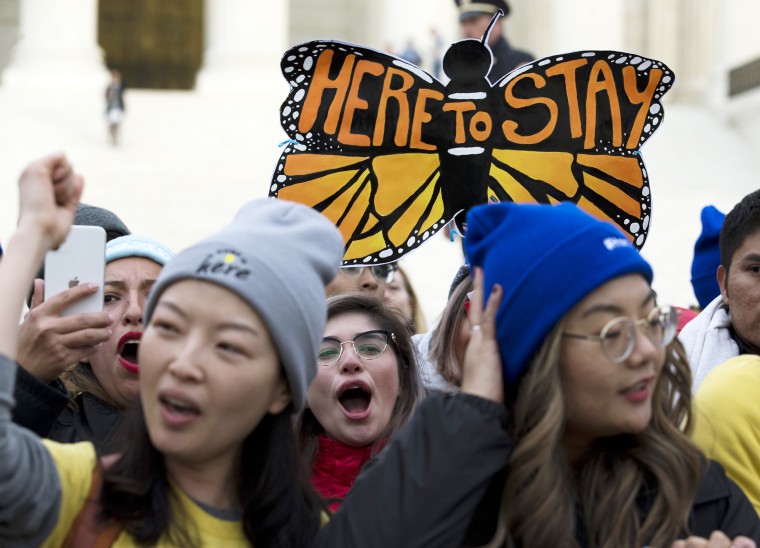The White House is preparing to take executive action to protect hundreds of thousands of immigrants known as “Dreamers,” people close to the White House told NBC News, as the Biden administration braces for a potential court defeat that could end the decade-old Deferred Action for Childhood Arrivals program.
Planning has intensified in recent days ahead of a decision on the program’s future from the 5th U.S. Circuit Court of Appeals, possibly within days. At stake is the ability of more than 600,000 people protected under the program, known as DACA, to continue living and working in the U.S. without fear of deportation. The conservative panel of judges is all but certain to rule that DACA is illegal. Although the Biden administration is likely to appeal the order, the Supreme Court has indicated it would agree with a 5th Circuit ruling that ends the Obama-era program.
With few options to act on its own, the Biden administration is readying steps that could continue to shield from deportation — at least temporarily — immigrants who were brought to the U.S. as children but lack legal status and were granted protections under the DACA program.
The order would direct Immigration and Customs Enforcement to deprioritize deporting DACA recipients and refrain from deporting them if they aren’t deemed threats to public safety or national security.
But the order could easily be reversed by another administration. When the Supreme Court ruled in 2020 to prevent the Trump administration from ending DACA, the majority opinion, written by Chief Justice John Roberts, said the Trump administration had gone about ending the program the wrong way. Legal experts believe the court, now more conservative, will ultimately rule that DACA itself is illegal, particularly because it allows for work authorization for undocumented migrants.
Without action from Congress, the program’s work authorizations are all but certain to end. Immigration experts say thousands could abruptly lose their ability to earn a living in the U.S.
“DACA has been threatened in the past, but the current case ahead of the 5th Circuit Court is the most severe threat to date,” said Todd Schulte, the president and executive director of FWD.US, a bipartisan political organization that advocates for progressive immigration reform. “If Congress does not pass legislation this year, it is likely that nearly 700,000 DACA recipients will be at risk of being forced out of their jobs and subjected to the threat of deportation. If the 5th Circuit rules against DACA, 1,000 existing DACA recipients will be at risk of losing their legal ability to work every single business day for the next 24 months.”
The planning for a possible court defeat echoes a strategy the administration tried to use after the Supreme Court overturned Roe v. Wade three months ago. After that decision, President Joe Biden signed an executive order and federal agencies took steps to try to preserve access to abortion where possible, although some abortion rights activists still criticized the White House for seeming unprepared.
In the DACA case, a disappointing ruling for supporters seems more likely than not, immigration advocates said. Not only has the 5th Circuit ruled unfavorably toward the Biden administration’s position previously in a related case, but any decision is also likely to be appealed to the Supreme Court, where the conservative majority would be expected to rule against DACA.
The Biden White House has repeatedly urged lawmakers to act to protect DACA recipients, who are commonly referred to as “Dreamers” based on never-passed proposals in Congress called the DREAM Act, and to overhaul immigration laws more broadly, but there are no signs that Congress will take up the matter seriously in the near future.
Senate Judiciary Committee Chair Dick Durbin, D-Ill., said Tuesday that he had recently spoken to Homeland Security Secretary Alejandro Mayorkas about the coming DACA decision. He didn’t say what Congress was prepared to do if DACA is terminated.
“I think national sentiment is strong in favor of the ‘Dreamers’ and DACA protectees. And if something terrible comes out of the 5th Circuit, I think it could be an issue in November,” said Durbin, referring to the midterm elections.
Sen. Kyrsten Sinema, D-Ariz., who has often gone against her party on key legislative proposals, said she would like to focus on immigration reform after November’s elections.
“The reality is that we have to address both our security needs and our workforce needs,” she said Monday in a speech at the McConnell Center. Referring to Sen. John Cornyn, R-Texas, she added, "And I hope to be able to partner with my friend John and deliver something in the next few months or a couple of years.”
In 2021, Sinema and Cornyn had jointly unveiled a bipartisan immigration bill responding to the surge of migrants at the border.
Similarly frustrated by immigration inaction in Congress, President Barack Obama created the DACA program in 2012 through executive action to protect people who were brought to the U.S. without citizenship or residency as children. The program has been the subject of intense court battles ever since, leaving participants in a near-constant state of legal limbo.
Since last year, the program has been closed to new applicants after a court ruled that DACA was unlawful but continued protections for existing recipients while the case wound through the courts.
This year, the Biden administration issued new regulations to strengthen the legal underpinnings for DACA and improve its prospects for surviving in court, although it’s unclear whether that will be enough to save the program.
A White House spokesman didn’t respond to requests for comment.


